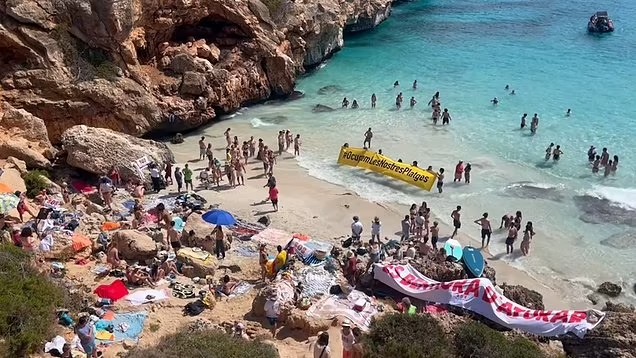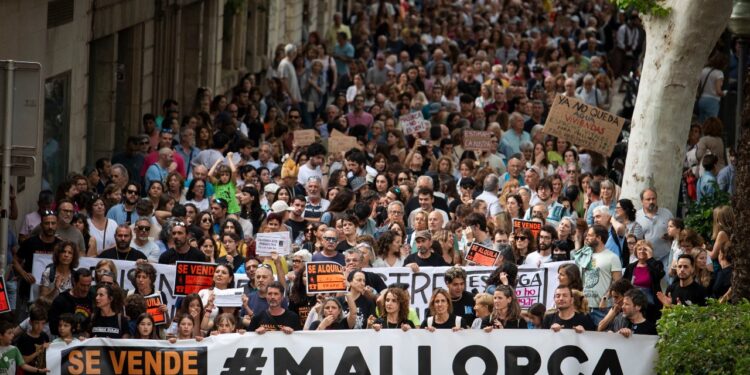Across Mallorca and other Mediterranean destinations, a growing resistance is building against the pressures of mass tourism. Residents, local authorities and environmental groups are speaking out, demanding that governments act to reclaim their cities, coasts and culture from the grip of overtourism.
From the winding alleyways of Palma de Mallorca to the beaches of Santorini and the harbours of Dubrovnik, discontent is becoming impossible to ignore. What was once a seasonal boom that provided income and employment is now viewed by many locals as an all-consuming force, reshaping daily life and eroding cultural identity. Anti-tourism graffiti, public protests, and even legislative proposals are emerging as symbols of a wider Mediterranean reckoning.
The turning tide in Mallorca
Mallorca, long known as a holiday paradise for sunseekers from northern Europe, has become the epicentre of a growing movement to curb tourism numbers. In summer 2024, thousands of residents took to the streets of Palma, demanding restrictions on short-term rentals, cruise ships, and tourism-driven real estate speculation.
The protests were not isolated. For years, Mallorcans have complained of rising housing prices, overtourism in UNESCO-protected sites such as the Serra de Tramuntana, and the degradation of local infrastructure due to the island’s seasonal population explosion. Public services are strained, roads congested, and the balance between quality of life and economic gain is under increasing scrutiny.
Local slogans such as “Mallorca no es vende” (Mallorca is not for sale) and “Tourists go home” may sound harsh, but they reflect a growing urgency. Many islanders feel alienated in their own communities, unable to afford housing and marginalised by the demands of an economy that increasingly caters only to visitors.
Environmental stress and cultural dilution
The environmental cost of mass tourism in the Mediterranean is substantial. Beaches eroded by constant foot traffic, marine ecosystems disturbed by recreational boating, and mountains of seasonal waste all contribute to a growing crisis. The Balearic Islands generate nearly 1.5 million tonnes of waste annually, a figure which spikes during the peak tourist season.
Water scarcity is another major issue. Mallorca, like many Mediterranean islands, relies on limited freshwater resources. With thousands of hotels, holiday lets and swimming pools to sustain, local aquifers are under pressure. Climate change exacerbates this dynamic, bringing longer droughts and more unpredictable rainfall.
Beyond the ecological burden lies the question of culture. Local festivals have been rebranded for tourists, historic neighbourhoods hollowed out by Airbnb, and traditional shops replaced by souvenir outlets. In essence, many feel the island is being transformed into a theme park for outsiders.
Policy responses and their limitations
In response to public pressure, Balearic authorities have begun to take action. A cap has been imposed on the number of available holiday rentals, especially in Palma. New licences for tourist accommodation have been frozen, and regulations on cruise ships aim to limit the number of daily arrivals to the port.
However, enforcement remains uneven. The economic dependency on tourism runs deep, accounting for nearly 45% of Mallorca’s GDP. Many politicians are hesitant to impose strict limits, fearing backlash from business owners, airlines, and hospitality firms. The tension between short-term economic benefits and long-term sustainability remains unresolved.
Some municipalities have taken matters into their own hands. The town of Deià introduced a reservation system for parking and access to popular coves. In Andratx, drones monitor beach overcrowding in real time. These experimental measures show promise, but they also highlight how reactive, rather than strategic, most responses have been.

A wider Mediterranean reckoning
Mallorca is far from alone. In Venice, large cruise ships were banned from entering the city centre, only for new docking plans to arise nearby. In Barcelona, residents have protested against gentrification and the loss of community as more buildings are converted into tourist apartments. In Santorini, overcrowding has prompted authorities to limit the number of cruise passengers allowed per day.
The root issue across the region is similar: economies that have become overly reliant on tourism are struggling to balance the benefits against mounting social and environmental costs. In many cases, tourism has morphed from an economic lifeline into a force of displacement and degradation.
Local voices are growing louder. Activists in Marseille have warned against the “Disneyfication” of their city. In the Algarve, residents have staged silent protests on beaches. Greek islands such as Mykonos and Corfu are debating whether the influx of seasonal visitors is worth the damage to their culture and landscape.
Reimagining the future
What would a sustainable tourism model look like? Experts suggest a combination of visitor caps, seasonal controls, investment in local infrastructure, and, crucially, diversification of regional economies. Encouraging slow travel, promoting off-season visits, and rethinking marketing strategies could help ease pressure on fragile ecosystems and social cohesion.
Education also plays a role. Tourists are not the enemy, but many arrive unaware of their impact. Encouraging respectful, environmentally conscious travel could shift behaviour and foster greater empathy between visitors and hosts.
Some regions are already experimenting with alternative models. In Menorca, a biosphere reserve designation has allowed tighter ecological protections. Slovenia’s eco-tourism strategy has received international praise. If Mediterranean destinations can learn from these examples, there may be a path forward.
Conclusion
The Mediterranean’s future cannot depend solely on the whims of mass tourism. As Mallorca and other destinations grapple with the consequences of overtourism, the message is becoming clear: the region must reclaim its space, protect its resources, and put residents first.
Sustainable tourism is no longer a luxury or niche ideal. It is a necessity. Without it, the culture, environment and communities that make the Mediterranean unique risk being lost to short-term profits and unchecked development.
REFH – newshub finance12 July 2025, 12:48




Recent Comments